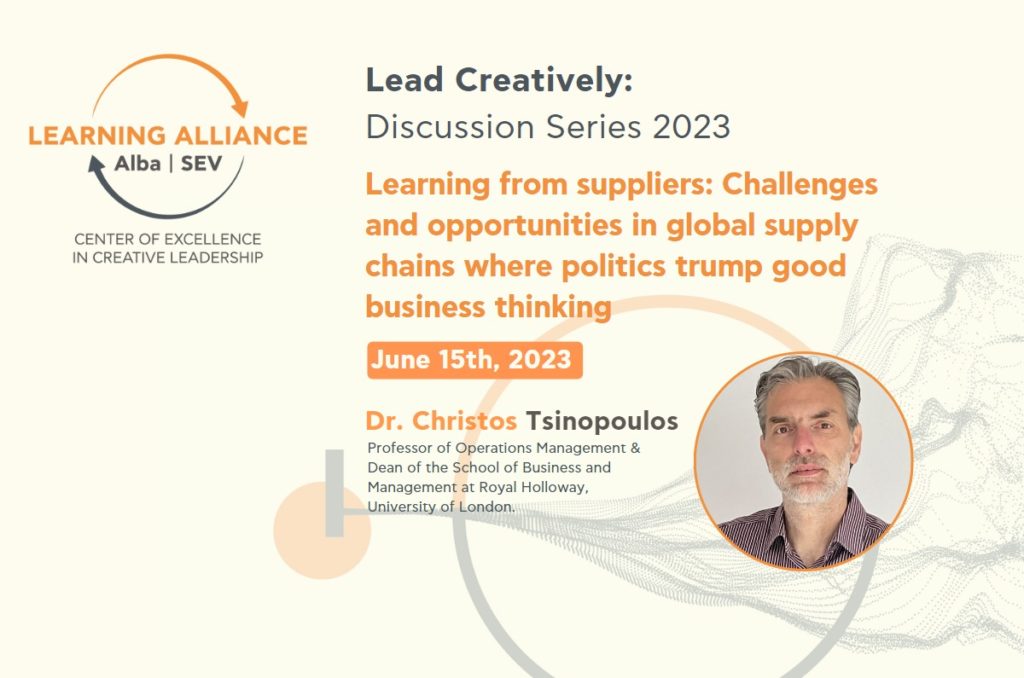
Learning from suppliers: Challenges and opportunities in global supply chains where politics trump good business thinking
The SEV Center of Excellence in Creative Leadership invites you to its upcoming event entitled “Learning from suppliers: Challenges and opportunities in global supply chains where politics trump good business thinking”, on Tuesday, June 15, 16:00-17:30, at Alba Graduate Business School (Xenias 6-8, Athens)
The event will be held in Greek and will be broadcast via livestream.
Register here
Short Description
When the disruption in global supply chains is a consequence of deliberate government decisions, what can managers do?
In this talk, Professor Tsinopoulos will discuss the key factors that enable a seamless supply chain and the benefits of listening to suppliers when pursuing innovation in new product development. He will the explain the impact political events had on the effective and efficient flow of information by focusing particularly on Brexit. Using examples from his own work he will explain how technology, flexibility and careful process design can be used to manage situations where politics trump good business thinking.
Global supply chains are complex and dynamic networks of interdependent firms that produce and deliver goods and services to customers across the world. When managed correctly, they can help lower costs, raise customer satisfaction, and improve access to markets. Furthermore, suppliers who are often competent businesses, can be an excellent source of innovation. They can provide ideas and informed solutions to the problems their customers are facing. However, supply chains also face constant challenges, such as uncertainty, disruption, and competition. To deal with these challenges, supply chain managers have been advocating for government policies that enable the free and uninterrupted flow of information. This assumes a common set of rules and standards. Big economic blocks, such as the EU and NAFTA have provided an ideal backdrop for supply chains to operate effectively. Yet, recent political developments have put this trend at a risk. Brexit in the EU and barriers to trade in the US are two relatively recent examples where politics have been deliberately undermining the effective integration of supply chains.
Bio
Dr. Christos Tsinopoulos is a Professor of Operations Management. Since September of 2022 has been Dean of the School of Business and Management at Royal Holloway, University of London.
His work focuses on sustainability, innovation, and supply chain management. Professor Tsinopoulos is a strong advocate of impactful research on a global scale, he has been a trustee of the Society for the Advancement of Management, a member of the executive committee of the Institution of Mechanical Engineers’ Manufacturing Excellence awards, and a visiting professor in Universities in Greece (Athens), USA (Fuqua) and China (Harbin and Hunan). His work has been published in the top journals in the field of operations and technology management and is frequently funded by industrial partners nationally and internationally, to inform policy.
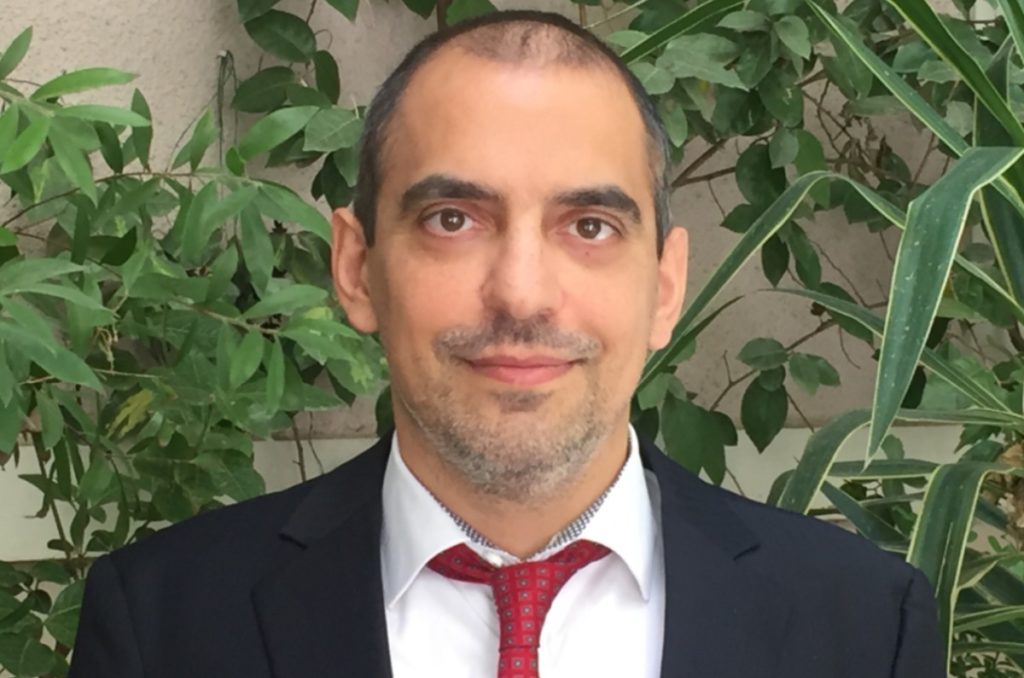
Greece and the Industry 4.0 intelligent automations
Article by Alex Nikolaidis, Associate Advisor, Sector of Industry, Development, Networks & Regional Policy, SEV, at Business File
Demand for intelligent industrial automations in Greece is increasing during the last years. Several Greek manufacturing companies, mainly in the sectors of food industry and metal constructions, have made progress in integrating Robotic Process Automation (RPA) and intelligent systems into production process, inventory management, preventive maintenance, invoice processing, etc., gaining know-how from international best practices.
However, domestic industry has the potential to make further progress, given the automation / digitalization levels of more mature European and international markets. According to the International Federation of Robotics (EFR), in 2016 Greece was ranked 36th in 44 countries regarding the robot density in the manufacturing industry (17 robots / 10,000 employees in industry, although the actual number might be much lower due to re-exports), lagging Portugal (58), Hungary (57), Poland (32), Israel (31) and Turkey (23). Since then, we estimate that the density index of Greece is improved, since several investments in robotic systems and smart factories were made, but not to an extent that would enable our country to converge on other European countries.
Competitive advantages
The development of a smart factory, that integrates industrial automations and digital technologies, includes benefits like better quality management (lower cost of control mechanisms by 7-12%), faster prototyping procedures up to 30%, focus on preventive maintenance (increased production time up to 60%, reduced maintenance costs by 5-10%), increased availability of raw materials by 20-30%, increased productivity of assets by 10-20%, improved quality by 10-35%, shorter changeover by 10-20% and lower inventory volume by 15-25%. Overall, production facilities become more efficient, since repetitive tasks are conducted with high precision and speed, while enterprises are more agile, adjusting timely their production volume to the fluctuations of demand.
Transformation of jobs
It’s more precise to say that the disruptive technologies of the 4th Industrial Revolution, intelligent automations included, will contribute to the transformation of jobs (and not actually loss). SEV foresees that the changes will focus on augmenting human tasks with intelligent automations. Also, we should have in mind that the integration of intelligent systems in manufacturing may contribute to the emergence of new professions and job opportunities. For instance, investments in robots will surely increase demand for operators and engineers of robotic systems, chief robotics officers, technicians for augmented reality systems, etc. In this respect, enterprises have to upskill/reskill their workforce.
Greek SMEs and Robots
SMEs have a lot to benefit from Industry 4.0 automations. We expect that funding will be widely available from 2022 onwards. Indicatively, “Greece 2.0” plan will prioritize the financing of SMEs through subsidies of approximately €370 mn. for digital transformation actions (electronic payments, telework, digital office, etc.). Also, it will provide €75 mn. to manufacturing SMEs for investments in smart manufacturing and AI technologies. The new Development Law will prioritize digital transition, providing subsidies for investments in digital and technological transformation, the use of “Industry 4.0” technologies, robotics and AI, and the upgrade of relevant skills. Similarly, the new “Digital Transformation” program of NSRF 2021-2027 will include horizontal actions regarding the stimulation of investments of SMEs in innovative technologies, their take-up in all sectors of the economy, the development of digital skills, etc.
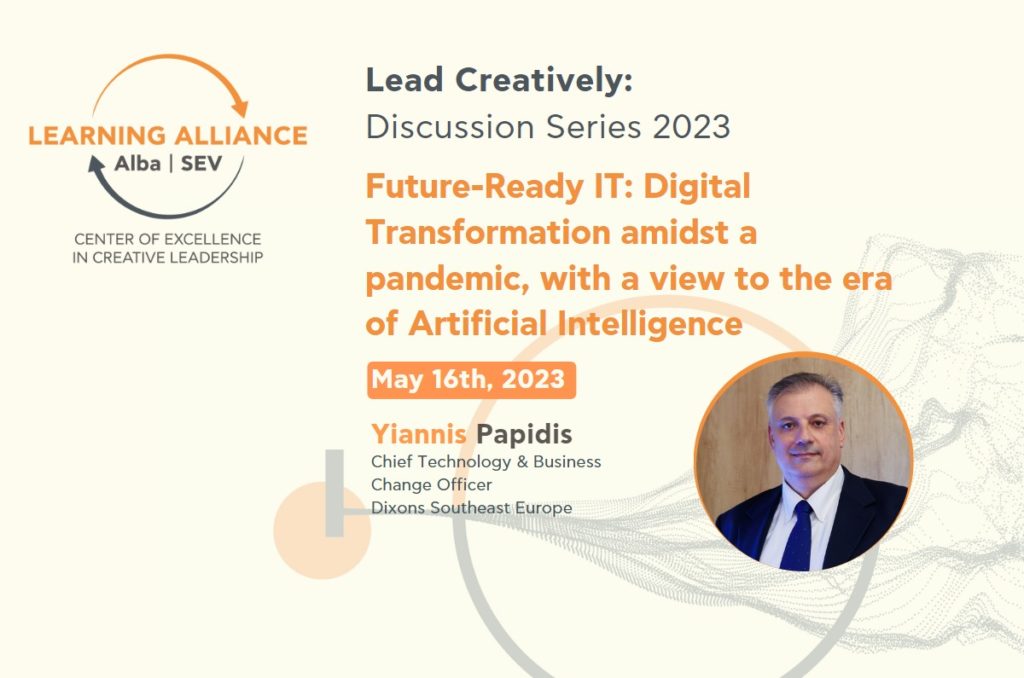
Future-Ready IT: Digital Transformation amidst a pandemic, with a view to the era of Artificial Intelligence
The SEV Center of Excellence in Creative Leadership invites you to its upcoming event entitled “Future-Ready IT: Digital Transformation amidst a pandemic, with a view to the era of Artificial Intelligence”, on Tuesday, May 16, 16:00-17:30, at Alba Graduate Business School (Xenias 6-8, Athens)
The event will be held in Greek and will be broadcast via livestream.
Register here
Short Description
Given the successive crises, surprising shocks, and disruptive opportunities and threats, every business needs readiness, agility, capabilities, and tools not only to respond, but to stay ahead of the curve.
How do businesses leverage digital technologies to replace their infrastructure, improve customer experience, optimize their operations and empower their employees? What are the best practices, lessons and future trends shaping the digital transformation strategy? How can we prepare our infrastructure and human resources for the era of artificial intelligence that is already transforming every industry and sector?
Yiannis Papidis will present the case study of Kotsovolos who successfully navigated the digital transformation while at the same time having to re-arrange its priorities during the pandemic.
Come to the event venue earlier to interact with the demo of the innovative retail advertising platform that Kotsovolos has developed.
The economy needs a pro-growth policy focusing on investment, productivity and employment – SEV’s monthly economic bulletin
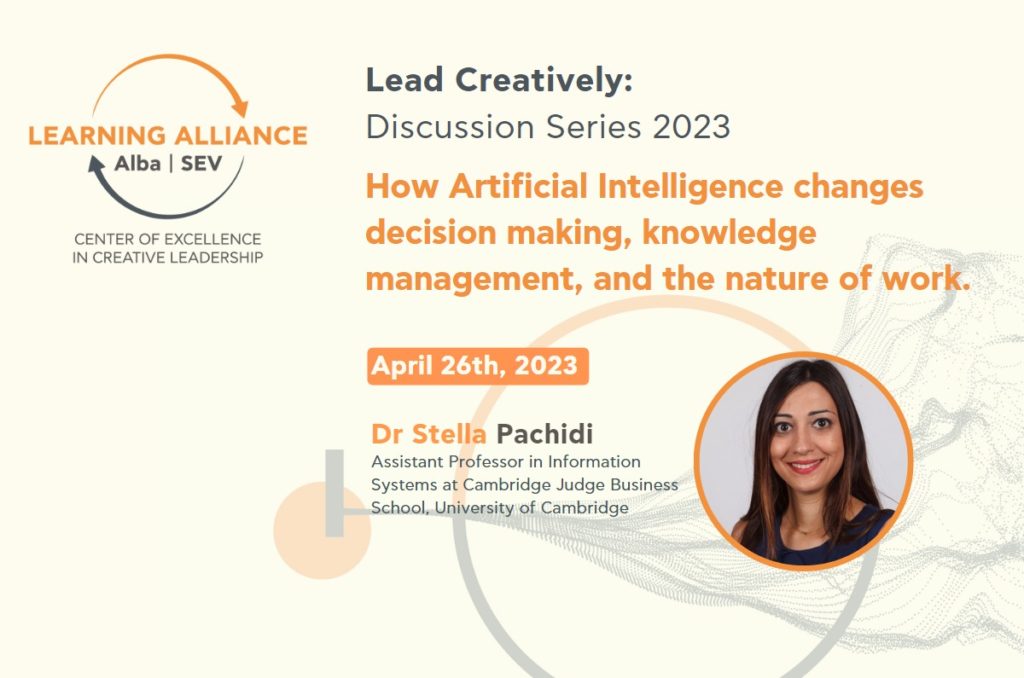
How Artificial Intelligence changes decision making, knowledge management, and the nature of work
The SEV Center of Excellence in Creative Leadership invites you to its upcoming event entitled “How Artificial Intelligence changes decision making, knowledge management, and the nature of work”.
Short Desctiption
Dr. Stella Pachidi, a Poets & Quants Best 40-unde-40 Professor, will present her pioneering research that has been published in world-leading academic journals such as Organization Science. How do novel algorithmic technologies and artificial intelligence tools change the nature of work and specifically knowledge creation and sharing processes or decision making methods? By drawing on ethnographic and other qualitative studies she will present the unavoidable changes that emerge in the structure and culture of a company, in the management of human resources, and in the patters of cross-disciplinary collaboration. She will conclude by focusing on the role of leadership in activating and handling such changes.
Bio
Dr Stella Pachidi works as Assistant Professor in Information Systems at Cambridge Judge Business School, University of Cambridge. Her research interests lie in the intersection of technology, work and organising. Currently, her research projects include the introduction of artificial intelligence technologies in organisations, managing challenges in the workplace during digital transformation, and practices of knowledge collaboration across boundaries. Dr Pachidi holds a PhD in Business Administration from VU University Amsterdam, a MSc in Business Informatics from Utrecht University, and a MSc in Electrical and and Computer Engineering from National Technical University of Athens. She has articles in information systems and organisation journals and books including Organization Science, Information and Organization, Organization Theory, Journal of the Association for Information Systems, MIS Quarterly Executive, Computers in Human Behavior, and The Routledge Companion to Management Information Systems. She has presented her work in various major conferences in the fields of technology and organisations including the Academy of Management Meeting, the International Conference on Information Systems, the European Group for Organizational Studies Colloquium, the Process Symposium and others. Dr Pachidi is a member of the editorial review board of Information and Organization and is currently guest editor of the Journal of Management Studies special issue on “Artificial Intelligence: Organizational Possibilities and Pitfalls”. In 2021, Dr Pachidi was listed by Poets & Quants in their list of “Best 40 Under 40 Professors”.
Please find here the registration form.
Recovering without an investment boom… – SEV’s monthly economic bulletin
Wages, Productivity and Competitiveness in Greece
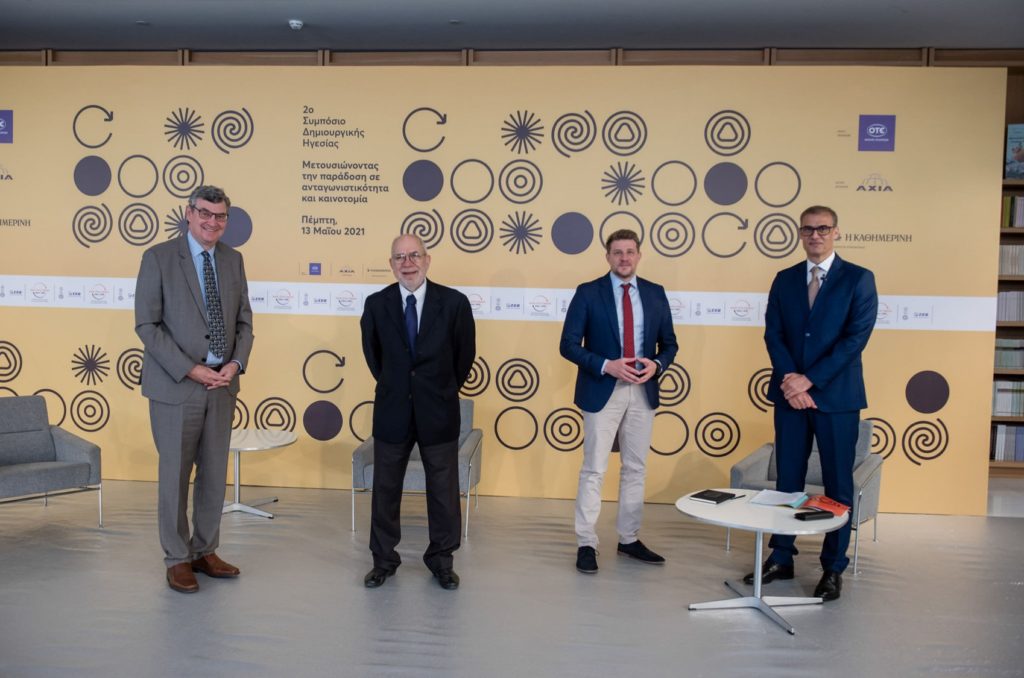
Transforming Tradition into Competitiveness and Innovation
The co-existence of tradition and innovation at the heart of the 2nd Annual Symposium of the SEV Center of Excellence in Creative Leadership
Stimulating discussions, distinguished speakers and high participation were the elements of the 2nd all-day Symposium in Creative Leadership that was rolled out in hybrid form and broadcast live from the Lighthouse of the Stavros Niarchos Foundation Cultural Center on May 13.
The event was themed “Transforming Tradition into Competitiveness and Innovation” and organized in the context of the “Learning Alliance” in cooperation with Alba Graduate Business School, The American College of Greece. The event coincided with the third anniversary of the Center’s operation and featured a wide selection of Greek organizational examples of transforming tradition into creativity and innovation.
In the total of seven sessions that took place, top executives from Greek enterprises, which have left an impressive mark both domestically and abroad, analyzed the history and vision of the enterprises they are in charge of and shared their perspective and experience on the power and inspiration that entrepreneurship can draw from tradition in combination with creativity and innovation.
The Symposium opened with welcome remarks by the General Director of SEV, Alexandros Chatzopoulos, who —commenting on creative leadership— said: “One of the greatest prerequisites in order to upgrade the country, and not just the economy, is the continuous and lifelong quality learning, as well as the upskilling of people, which, in our days, encompasses all generations regardless. From transitioning to sustainable growth, which is not only a title but demands consistent work and changes on the part of the enterprises, to technological developments that are constantly evolving, creative leadership, that is our ability to change, to create and to innovate, is the thing that will give us the possibility to reposition ourselves in a multi-faceted and highly competitive world.”
In his remarks, Chairman of the Alba Board of Directors, Stelios Argyros, speaking about this year’s Symposium, commented among others: “It may sound contradictory to discuss tradition at an age where so many technological and entrepreneurial disruptions take place, however tradition and creative leadership and the value advantage of excellence mesh/blend in the best possible way in order for us to create innovation and competitiveness. What we are trying to convey to the business world is the need to identify tradition with creative leadership and the content of values.”
Speaking on the value of lifelong learning, the President of The American College of Greece, Dr. David G. Horner, said: “We believe that education must play a key role in equipping individuals, organizations, and, ultimately, societies, with the abilities to adapt, to reimagine, to reinvent themselves.”
During the Symposium’s first session themed: “Organizational tradition as an enduring relationship” coordinated by the Director of the SEV Center of Excellence in Creative Leadership and Professor of Organizational Behavior at the Alba Graduate Business School, Dr. Charalampos Mainemelis, the Vice President of ION S.A., Mr. Efstathios Loizos, and Marketing Director of Papoutsanis S.A., Ms. Eirini Chatziioakeimidou, discussed the role of creativity and innovation in the evolution of iconic brands. The two speakers agreed that the successful maintenance of the enduring relation between iconic products and consumers is built on trust, which in turn relies on the consistency and effort of enterprises to remain relevant without losing their authentic elements and values.
In the session that followed themed “Research and new knowledge”, Director of Research and Development of Apivita S.A., Dr. Konstantinos Gardikis and Mr. Yannis Mandalas, CEO at Mediterra SA, and the Chios Mastiha Research Center, exchanged views of the role of research in the evolution of traditional production techniques and the transformation of traditional raw materials into innovative forms of new products. Moreover, they discussed how the research of tradition can create new forms of knowledge that allow in turn enterprises to leverage the development of a distinct identity and calibrate their competitive depth.
The third discussion with the topic “Greek tradition as a competitive advantage” was coordinated by Ms. Aggeliki Karavasili, Research Fellow of the SEV Center of Excellence in Creative Leadership and Alba Graduate Business School. The discussion panel consisted of the following guests: Ms. Afrodite Florou, co-founder of Anassa Organics, Head of Security and Front Desk Department at the Museum of Cycladic Art, Ms. Barbara Karpodini, and the Marketing Director of Grecotel S.A., Mr. Yannis Tsichlis. The speakers highlighted the value of creativity in the promotion and leveraging of cultural works, natural resources and other timeless elements of the Greek tradition, as well as the importance of showcasing the Greek tradition as a complex nexus of experiences and meaning.
Professor Charalampos Mainemelis took once again the co-ordinator’s seat for the fourth discussion, themed “Tradition as an entrepreneurial reorientation” featuring guest speakers Messrs. Vasilios Papagiannakos, Winemaker and Owner of the Papagiannakos Winery, and Zafeiris Trikalinos, Owner of Trikalinos Co. The two speakers discussed the dual role of creative leadership in maintaining and revisiting tradition, as well as the importance of bold leadership decisions in the re-orientation of entrepreneurial tradition towards new, sustainable and competitive horizons.
Alba Dean and Professor of International Business and Strategy at Alba Graduate Business School, Konstantinos Axarloglou, co-ordinated the following discussion, themed “The long tradition of Greek entrepreneurship.” The panel discussion featured Director for Employment and Labour Market Affairs, Mr. Christos Ioannou, Sustainability Director of ELVAL S.A., Mr. Ioannis Koufopanos, CEO of M.G. Chryssafidis SA ., Mr. Alexandros Makridis, and the Director of Group Innovation and Technology and Member of the Executive Committee at TITAN Cement Group, Mr. Fokion Tasoulas. The speakers referred to the decisive contribution that the organization’s value tradition makes in the empowerment of its distinct identity. They also analyzed the traditional characteristics and new challenges of Greek entrepreneurship.
Director for Employment and Labour Market Affairs, Mr. Christos Ioannou, said: “We are here for the second year and are trying to offer answers together with the market protagonists and enterprises – together we can profile the production history of Greece in order to have imitators. Ιt is important to support the novel entrepreneurial tradition as it is the one that has created growth.”
The next session focused on “a Greek case study of creative tradition since 1879,” namely Boutari Wines. Professor Charalampos Mainemelis welcomed Dr. Yiannis Vogiatzis, General Manager and Chief Oenologist, Mr. Constantine S. Boutari, President and CEO, and Ms. Marina Boutari, Commercial Director of Boutari Wineries. The speakers discussed in depth the role of research and development in the promotion of indigenous grape varieties and the connecting link between tradition, locality and global orientation. As the speakers highlighted, the company insisted systematically on the research for the development of qualities that are acceptable by Greek and foreign visitors, incorporating tradition in the new trends, and leveraging tourism as an alternative means to exports.
In the seventh and last session, titled “Tradition as creative revival”, Mrs. Lydia Vousvouni, Head of Design at Zeus + Δione and Mr. Alexandros Efklidis, Theatrologist, Director and Artistic Director of the Alternative Stage of the Greek National Opera, discussed with the co-ordinator, Professor Mainemelis, about creative ways of refreshing and reexpressing tradition. During the discussion, the speakers presented their experiences related to reworking elements of the past with fresh eyes and then incorporating them into what is new.
WATCH THE FULL 2ND SYMPOSIUM OF THE SEV CENTER OF EXCELLENCE IN CREATIVE LEADERSHIP
